|
 |
|
| A 31-year-old Mark
Twain joined a tour to Europe and the Holy Land in
1867. Mark Twain was virtually unknown as the
"Quaker City" sailed out of New York harbor with no
celebrities on board. But she returned with
The Great American Humorist. Many of Twain’s
dispatches to New York and San Francisco newspapers
poked fun at his fellow travelers, as well as at the
natives. The tips below are adapted from
Twain’s best selling The Innocents Abroad, published
in 1869. I've added present-day photos. |
|
-
Pay attention en route
to Nazareth – or you may find a camel nibbling at
your ear!
|
Two
hours from Tabor to Nazareth -- and as it was an
uncommonly narrow, crooked trail, we necessarily met
all the camel trains and jackass caravans between
Jericho and Jacksonville in that particular place
and nowhere else. The donkeys do not matter so
much, because they are so small that you can jump
your horse over them if he is an animal of spirit,
but a camel is not jumpable.
The camel would not turn out for a king. He
stalks serenely along, bringing his cushioned stilts
forward with the long, regular swing of a pendulum,
and whatever is in the way must get out of the way
peaceably, or be wiped out forcibly by the bulky
sacks. |
|
|
|
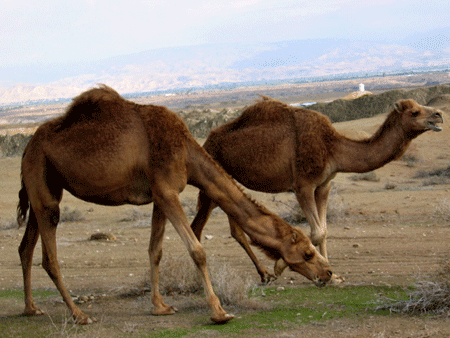 |
|
Photo: Gila Yudkin |
|
"The camel would not turn out for
a king!" (Mark Twain) |
|
|
|
It was a tiresome ride to us, and perfectly
exhausting to the horses. We were compelled to
jump over upwards of eighteen hundred donkeys, and
only one person in the party was unseated less than
sixty times by the camels. |
|
|
| I can
not think of any thing, now, more certain to make
one shudder, than to have a soft-footed camel sneak
up behind him and touch him on the ear with its
cold, flabby under-lip. A camel did this for
one of the boys, who was drooping over his saddle in
a brown study. He glanced up and saw the
majestic apparition hovering above him, and made
frantic efforts to get out of the way, but the camel
reached out and bit him on the shoulder before he
accomplished it. This was the only pleasant
incident of the journey. |
|
|
|
|
|
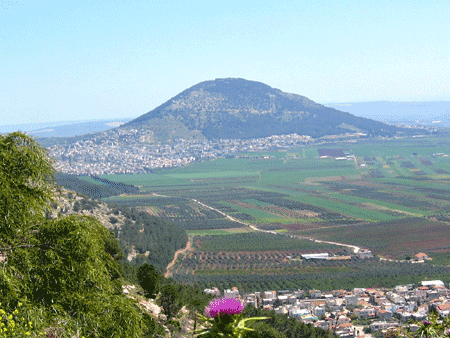 |
|
Photo: Gila
Yudkin |
|
Mark Twain's journey from Mount
Tabor (in photo) to Nazareth was 2 hours |
|
-
Prepare some baksheesh –
you may need to sneeze.
|
|
At Nazareth we camped in an olive grove near the
Virgin Mary's fountain, and that wonderful Arab
"guard" came to collect some baksheesh for his
"services" in following us from Tiberias and warding
off invisible dangers with the terrors of his
armament. The dragoman [professional guide] had paid
his master, but that counted as nothing -- if you
hire a man to sneeze for you, here, and another man
chooses to help him, you have got to pay both.
They do nothing whatever without pay. |
|
|
|
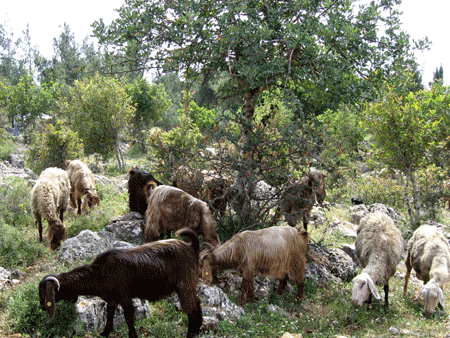 |
|
Photo: Gila
Yudkin |
|
Mark Twain may have camped in this
grove in Nazareth |
|
|
|
How it must have surprised these people to hear the
way of salvation offered to them "without money and
without price." If the manners, the people or
the customs of this country have changed since the
Savior’s time, the figures and metaphors of the
Bible are not the evidences to prove it by. |
|
|
|
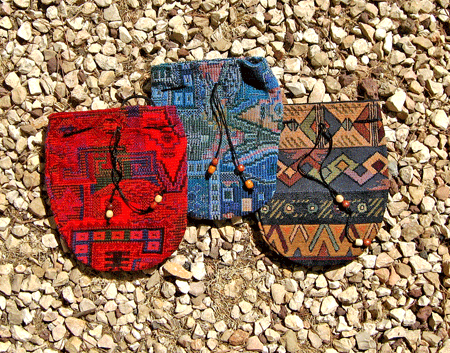 |
|
Smart-looking
Holy Land pouches,
not available in Mark Twain's day |
|
|
-
Be grateful to the
Catholic monks who drove stakes through traditions
to preserve them.
|
|
These gifted Latin monks never do any thing by
halves. If they were to show you the Brazen
Serpent that was elevated in the wilderness, you
could depend upon it that they had on hand the pole
it was elevated on also, and even the hole it stood
in.
They have got the "Grotto" of the Annunciation
here; and just as convenient to it as one's throat
is to his mouth, they have also the Virgin's
Kitchen, and even her sitting-room, where she and
Joseph watched the infant Savior play with Hebrew
toys eighteen hundred years ago. All under one
roof, and all clean, spacious, comfortable
"grottoes." |
|
|
|
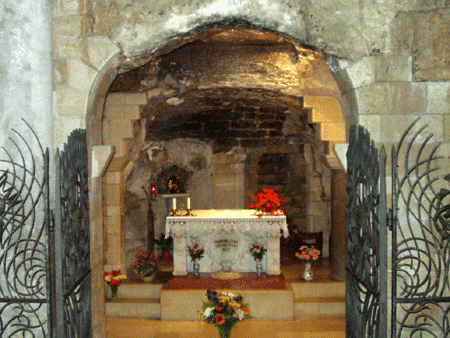 |
|
Photo: Gila
Yudkin |
|
Grotto of the Annunciation in
Nazareth visited by Mark Twain |
|
|
|
It seems curious that personages intimately
connected with the Holy Family always lived in
grottoes -- in Nazareth, in Bethlehem, in imperial
Ephesus--and yet nobody else in their day and
generation thought of doing any thing of the kind.
If they ever did, their grottoes are all gone, and I
suppose we ought to wonder at the peculiar marvel of
the preservation of these I speak of. When the
Virgin fled from Herod's wrath, she hid in a grotto
in Bethlehem, and the same is there to this day.
The slaughter of the innocents in Bethlehem was done
in a grotto; the Savior was born in a grotto--both
are shown to pilgrims yet. |
|
|
|
If it had been left to Protestants to do this most
worthy work, we would not even know where Jerusalem
is to-day, and the man who could go and put his
finger on
Nazareth would be too wise
for this world.
The world owes the Catholics its good will even
for the happy rascality of hewing out these bogus
grottoes in the rock; for it is infinitely more
satisfactory to look at a grotto, where people have
faithfully believed for centuries that the Virgin
once lived, than to have to imagine a dwelling-place
for her somewhere, any where, nowhere, loose and at
large all over this town of Nazareth. There is
too large a scope of country. The imagination
can not work. There is no one particular spot
to chain your eye, rivet your interest, and make you
think. |
|
|
|
The memory of the Pilgrims can not perish while
Plymouth Rock remains to us. The old monks are
wise. They know how to drive a stake through a
pleasant tradition that will hold it to its place
forever. |
|
|
-
The Holy Land has
small-scale geography, but large-scale impact.
|
|
Like my grapes which the spies bore
out of the Promised Land, I have got everything in
Palestine on too large a scale. The word
Palestine always brought to my mind a vague
suggestion of a country as large as the United
States. I do not know why, but such was the
case. I suppose it was because I could not
conceive of a small country having so large a
history. |
|
|
|
When I was a boy I somehow got the impression that
the river Jordan was four thousand miles long and
thirty-five miles wide. It is only ninety
miles long, and so crooked that a man does not know
which side of it he is on half the time. In
going ninety miles it does not get over more than
fifty miles of ground. It is not any wider
than Broadway in New York. |
|
|
|
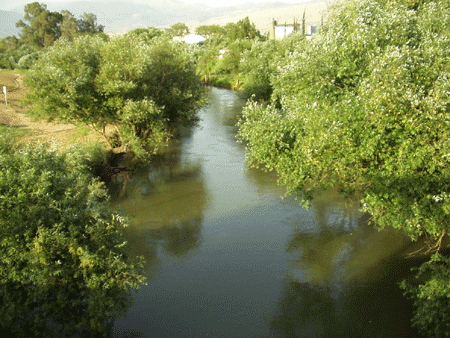 |
|
Photo: Gila
Yudkin |
|
The River Jordan is "not any wider
than Broadway in New York" (Mark Twain) |
|
|
Leaving out two or three short journeys of the
Savior, he spent his life, preached his gospel, and
performed his miracle within a compass no larger
than an ordinary county in the United States.
It is as much as I can do to comprehend this
stupefying fact. How it wears a man out to have to
read up to a hundred pages of history every two or
three miles -- for verily the celebrated localities
of Palestine occur that close together. How
wearily, how bewilderingly they swarm about your
path!
We are surfeited with sights....The sights are too
many. They swarm about you at every step; no
single foot of ground in all Jerusalem seems to be
without a stirring and important history of its own.
It is a very relief to steal a walk of a hundred
yards without a guide along to talk unceasingly
about every stone you step upon and drag you back
ages and ages to the day when it achieved celebrity.
|
|
|
-
Marvel at how Palestine has developed since Mark
Twain’s time.
|
Of all the lands there are for dismal scenery, I
think Palestine must be the prince. The hills are
barren, they are dull of color, they are unpicturesque in shape. The valleys are unsightly
deserts fringed with a feeble vegetation that has an
expression about it of being sorrowful and
despondent.
The Dead Sea and the Sea of Galilee sleep in the
midst of a vast stretch of hill and plain wherein
the eye rests upon no pleasant tint, no striking
object, no soft picture dreaming in a purple haze or
mottled with the shadows of the clouds. Every
outline is harsh, every feature is distinct, there
is no perspective--distance works no enchantment
here. It is a hopeless, dreary, heart-broken land. |
|
|
|
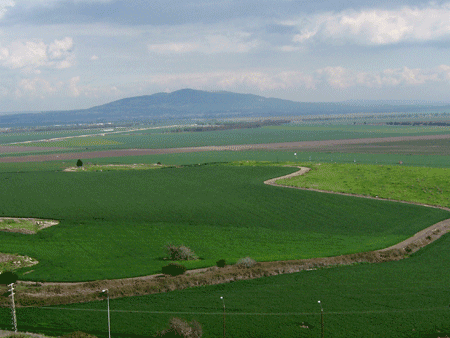 |
|
Photo: Gila
Yudkin |
|
A dismal land no longer: The
Jezreel Valley |
|
|
-
If you board a ship at
Jaffa, be sure you have a ticket – else you will be
thrown up by a whale.
|
Simon the Tanner formerly lived here [in Jaffa]. We
went to his house. All the pilgrims visit Simon the
Tanner's house. Peter saw the vision of the beasts
let down in a sheet when he lay upon the roof of
Simon the Tanner's house.
It was from Jaffa that Jonah sailed when he was told
to go and prophesy against Nineveh, and no doubt it
was not far from the town that the whale threw him
up when he discovered that he had no ticket. Jonah
was disobedient, and of a fault-finding, complaining
disposition, and deserves to be lightly spoken of,
almost. |
|
|
|
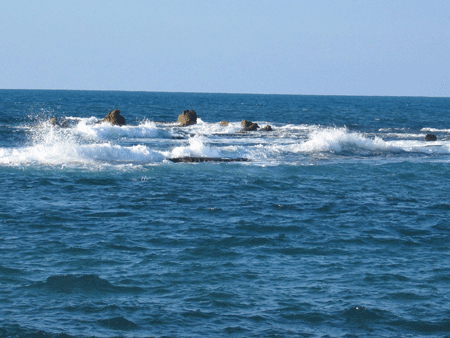 |
|
Photo: Gila
Yudkin |
|
These rocks served as breakwaters
for the ancient port of Jaffa |
|
-
From the ramparts of Old Jerusalem, observe
the knobbiness of the city.
|
A fast walker could go outside the walls of
Jerusalem and walk entirely around the city in an
hour. I do not know how else to make one understand
how small it is. The appearance of the city is
peculiar. It is as knobby with countless little
domes as a prison door is with bolt- heads. Every
house has from one to half a dozen of these white
plastered domes of stone, broad and low, sitting in
the centre of, or in a cluster upon, the flat roof.
Wherefore, when one looks down from an eminence,
upon the compact mass of houses (so closely crowded
together, in fact, that there is no appearance of
streets at all, and so the city looks solid,) he
sees the knobbiest town in the world, except
Constantinople. It looks as if it might be roofed,
from centre to circumference, with inverted saucers. |
|
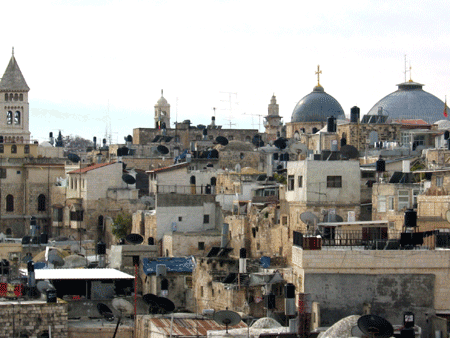 |
|
Photo: Gila
Yudkin |
|
"There is no appearance of streets
at all" (Mark Twain) |
|
| The houses are generally two stories high, built
strongly of masonry, whitewashed or plastered
outside, and have a cage of wooden lattice-work
projecting in front of every window. To reproduce a
Jerusalem street, it would only be necessary to
up-end a chicken-coop and hang it before each window
in an alley of American houses. |
|
-
Jerusalem’s alley cats
demonstrate the narrowness of the streets.
|
The streets are roughly and badly paved with stone,
and are tolerably crooked -- enough so to make each
street appear to close together constantly and come
to an end about a hundred yards ahead of a pilgrim
as long as he chooses to walk in it. Projecting from
the top of the lower story of many of the houses is
a very narrow porch-roof or shed, without supports
from below; and I have several times seen cats jump
across the street from one shed to the other when
they were out calling. The cats could have jumped
double the distance without extraordinary exertion.
I mention these things to give an idea of how narrow
the streets are. Since a cat can jump across them
without the least inconvenience, it is hardly
necessary to state that such streets are too narrow
for carriages. These vehicles cannot navigate the
Holy City. |
|
- Don't look for St.
Veronica's handkerchief at Station of the Cross #6
– it's in Paris, or Milan, or Rome….
|
We
crossed a street, and came presently to the former
residence of St. Veronica. When the Savior passed
there, she came out, full of womanly compassion, and
spoke pitying words to him, undaunted by the
hootings and the threatenings of the mob, and wiped
the perspiration from his face with her
handkerchief.
We had heard so much of St. Veronica, and seen her
picture by so many masters, that it was like meeting
an old friend unexpectedly to come upon her ancient
home in Jerusalem. The strangest thing about
the incident that has made her name so famous, is,
that when she wiped the perspiration away, the print
of the Savior's face remained upon the handkerchief,
a perfect portrait, and so remains unto this day. |
|
| We knew
this, because we saw this handkerchief in a
cathedral in Paris, in another in Spain, and in two
others in Italy. In the Milan cathedral it
costs five francs to see it, and at St. Peter's, at
Rome, it is almost impossible to see it at any
price. No tradition is so amply verified as
this of St. Veronica and her handkerchief. |
|
-
Travel encourages
broad-mindedness.
|
|
Travel is fatal to prejudice, bigotry and
narrow-mindedness. Broad, wholesome,
charitable views of men and things can not be
acquired by vegetating in one little corner of the
earth all one's lifetime. |
|
|
-
Holy Land memories are
priceless.
|
In time
this fatigue will be forgotten; the heat will be
forgotten; the thirst, the tiresome volubility of
the guide, the persecutions of the beggars -- and
then, all that will be left will be pleasant
memories of Jerusalem, memories we shall call up
with always increasing interest as the years go by,
memories which some day will become all beautiful
when the last annoyances that encumbers them shall
have faded out of our minds never again to return.
To us, Jerusalem and today's experiences will be an
enchanted memory a year hence -- memory which money
could not buy from us. |
|
|
|
Copyright 2009,
2011
Gila Yudkin. Permission needed to reprint in
any medium. |
|
|

